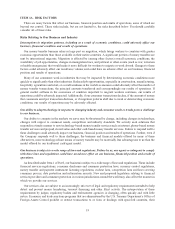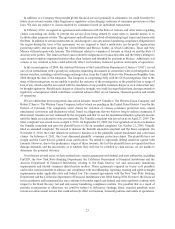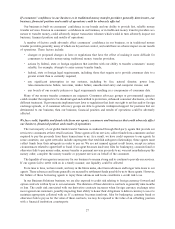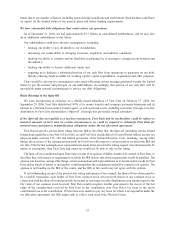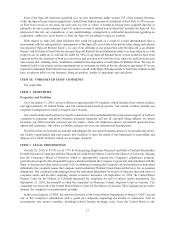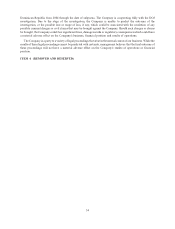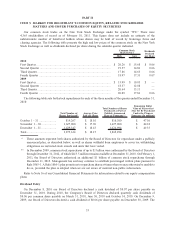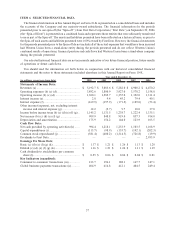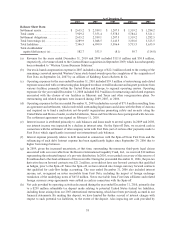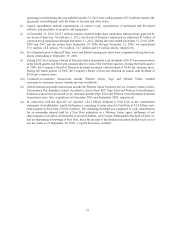Western Union 2010 Annual Report Download - page 31
Download and view the complete annual report
Please find page 31 of the 2010 Western Union annual report below. You can navigate through the pages in the report by either clicking on the pages listed below, or by using the keyword search tool below to find specific information within the annual report.If we are unable to maintain our agent, subagent or global business payments networks under terms consistent
with those currently in place, or if our agents or subagents fail to comply with Western Union business and
technology standards and contract requirements or applicable laws and regulations, our business, financial
position and results of operations would be adversely affected.
Most of our consumer-to-consumer revenue is derived through our agent network. In addition, our international
agents may have subagent relationships in which we are not directly involved. Transaction volumes at existing agent
and subagent locations often increase over time and new agents and subagents provide us with additional revenue.
If, due to competition or other reasons, agents or subagents decide to leave our network, or if we are unable to sign
new agents or maintain our agent network under terms consistent with those currently in place, or if our agents are
unable to maintain relationships with or sign new subagents, our revenue and profit growth rates may be adversely
affected. Agent attrition might occur for a number of reasons, including a competitor engaging an agent or an
agent’s dissatisfaction with its relationship with us or the revenue derived from that relationship. In addition, agents
may generate fewer transactions or less revenue for various reasons, including increased competition or changes in
the economy. Because an agent is a third party that engages in a variety of activities in addition to providing our
services, it may encounter business difficulties unrelated to its provision of our services, which could cause the
agent to reduce its number of locations, hours of operation, or cease doing business altogether.
We rely on our agents’ information systems and/or processes to obtain transaction data. If an agent or subagent
loses information, if there is a significant disruption to the information systems of an agent or subagent, or if an
agent or subagent does not maintain the appropriate controls over their systems, we may experience reputational
harm which could result in losses to the Company.
The types of enterprises that are legally authorized to act as our agents vary significantly from one country to
another. Changes in the laws affecting the kinds of entities that are permitted to act as money transfer agents (such as
changes in requirements for capitalization or ownership) could adversely affect our ability to distribute our services
and the cost of providing such services, both by us and our agents. For example, a requirement that a money transfer
provider be a bank or other highly regulated financial entity could increase significantly the cost of providing our
services in many countries where that requirement does not exist today or could prevent us from offering our
services in an affected country. Further, any changes in law that would require us to provide directly the money
transfer services to consumers as opposed to through an agent network—effectively changing our business model—
could significantly adversely impact our ability to provide our services, and/or the cost of our services, in the
relevant jurisdiction. Changes mandated by laws which make Western Union responsible for any acts of its agents
while they are providing the Western Union money transfer service increase our risk of regulatory liability and our
costs to monitor our agents’ performance.
Our agents are subject to a variety of regulatory requirements, which differ from jurisdiction to jurisdiction and
are subject to change. A material change in the regulatory requirements necessary to offer money transfer services
in a jurisdiction important to our business could mean increased costs and/or operational demands on our agents,
which could result in the attrition of agents and subagents, a decrease in the number of locations at which money
transfer services are offered and other negative consequences. The regulatory status of our agents could affect their
ability to offer our services. For example, our agents in the United States are considered Money Service Businesses,
or “MSBs,” under the Bank Secrecy Act. An increasing number of banks view MSBs, as a class, as higher risk
customers for purposes of their anti-money laundering programs. Furthermore, some of our domestic and
international agents have had difficulty establishing or maintaining banking relationships due to the banks’
policies. If a significant number of agents are unable to maintain existing or establish new banking relationships,
they may not be able to continue to offer our services.
Although most of our Orlandi Valuta and Vigo branded agents are not exclusive, most of our Western Union
branded agents have offered our services on an exclusive basis—that is, they have agreed by contract not to provide
any non-Western Union branded money transfer services. While we expect to continue signing agents under
exclusive arrangements and believe that these agreements are valid and enforceable, changes in laws regulating
competition or in the interpretation of those laws could undermine our ability to enforce them in the future.
Recently, several countries in the Commonwealth of Independent States, Africa and South Asia, including India,
have promulgated laws or regulations that effectively prohibit payment service providers, such as money transfer
29


